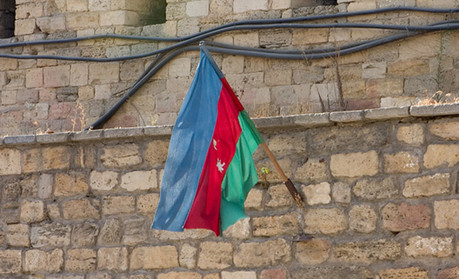
Six journalists are currently in prison in Azerbaijan, with the country ranked 162 for press freedom in a list of 179 counries
Credit: By ritingon on Flickr. Some rights reservedAs final preparations for the Eurovision song contest get underway, Azeri journalists have hit back at activists' claims for the competition to be boycotted.
The oil-rich state's poor human rights record, brought to light in February after Human Rights Watch and Amnesty International issued damning reports on the "illegal demolishing of houses" and the clampdown on dissidents and journalists, led to calls from the European Parliament, human rights activists and Azeri bloggers to boycott one of the biggest media events of the year.
But top investigative journalist Khadija Ismailova, who works for Radio Free Europe, says the competition is an opportunity for reporters to shine a light on Azerbaijan.
"Before the Eurovision song contest, there was such a scandal in this country, with musicians and journalists being arrested and tortured, with no freedom of speech and no freedom of assembly," she said.
"This scandal can be reflected [by journalists]. It's all about freedom of expression, and Eurovision is supposed to be about freedom of expression."
In March Ismailova spoke out about being the target of a blackmail attempt when a video purporting to show her engaged in sexual activities was released on the internet. She believes the campaign was aimed at halting her investigations into the financial dealings of President Ilham Aliyev and his family.
"Boycotting is something that won't work. It's better to convince people to come to Eurovision to talk about democracy, human rights and political prisoners.
"Part of the reason why the government is so harsh on the critics and journalists who are revealing all this is because they don't want the reality to be shown. They only want to show the façade of the country."
Azerbaijan's recent crackdown on the media in a bid to project a gleaming image of the capital, Baku, which is hosting this year's Eurovision Song Contest, has caused it to drop 10 places in the Reporters Without Borders Press Freedom Index. It is now ranked at 162 in a list of 179 countries assessed for press freedom levels.Boycotting is something that won't work. It's better to convince people to come to Eurovision to talk about democracy, human rights and political prisonersKhadija Ismailova
In April journalist Idrak Abbasov was beaten unconscious on the outskirts of Baku after trying to film houses being demolished.
"We all thought the human rights situation and the media freedom situation was getting better before Eurovision, but in the last few months they have taken a real nose dive," said Celia Davies of the Baku-based Institute for Reporter's Freedom and Safety, which has been documenting the attacks.
And last month the Committee to Protect Journalists (CPJ) issued a public letter to Aliyev after the organisation was "deeply disturbed by the recent wave of journalist imprisonments in Azerbaijan."
With six journalists currently behind bars, CPJ ranked Azerbaijan to be among the top 10 global jailers of the press.
Azeri blogger Emin Milli – who in 2009 was sentenced to 30 months in prison on charges of hooliganism, which press freedom groups claimed were fabricated – said he hopes the glitzy song contest will be an opportunity for activists to make their voices heard.
"I hope many of the songs will have messages. I hope there will be a few singers who will call directly at the event for the release of political prisoners," he said.
"I'm not a Eurovision fan. I don't like the music. But I'm very pragmatically using the fact that it should take place to shed light on serious problems we have in our society. I don't think boycotting Eurovision would help anyone.I'm very pragmatically using the fact that it should take place to shed light on serious problems we have in our societyEmin Milli
"The international media attention is important, and Eurovision helps to bring this attention to human rights violations in Azerbaijan – to the situation of freedom of speech, to all the problems in Azerbaijan, to communicate to a wider audience inside and outside Azerbaijan," he added.
But the European Broadcasting Union (EBU), which is organising the song contest, does not allow contestants to voice political messages in their songs.
"In the rules it says the contestants can't have political or commercial messages in their songs, or they are immediately disqualified," a spokesperson for the EBU said.
"It puts a spotlight on countries and the issues they are facing, but it's up to the countries and organisations to see how they use that spotlight. We campaign for media freedom but we're not going to use other shows to send out political messages – we are not a human rights organisation.
"It is fine that the contest is being used by many organisations to advance their intentions, but the EBU does not want to use an entertainment event or a sports event to do that.
"Fans won't want to watch Eurovision any more if it becomes political. Turning it into a political event would be the end of the song contest."
The International News Safety Institute is collaborating with the Institute for Reporter's Freedom and Safety to provide safety advice for journalists travelling to Baku to cover Eurovision.
Free daily newsletter
If you like our news and feature articles, you can sign up to receive our free daily (Mon-Fri) email newsletter (mobile friendly).
Related articles
- #JournalismMatters: The challenges of journalism in exile
- What to do if you are threatened with a SLAPP lawsuit
- WAN-IFRA: Five challenges to press freedom
- Economics woes affecting UK press freedom, RSF World Press Freedom Index finds
- Predictions for journalism 2024: misinformation, online safety and press freedom









